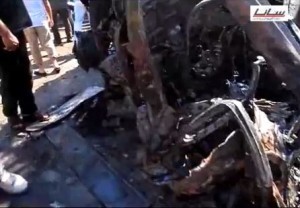Jaramana Recovers from Bombings, Still a Haven for Displaced

Karam Mansour
Editors’ Note: The editorial team changed the names of interviewees for their safety.
(Jaramana, Syria) – Fear and anxiety have reigned over the Damascus suburb of Jaramana since it became the frequent target of car bombs. According to Jaramana’s Red Crescent, 18 car bombs have exploded in the city during the past two and a half years, leaving more than 300 people dead.
The explosions did not have military targets. The worst of them targeted a funeral procession near the town’s cemetery on August 28, 2012, in addition to another attack on November 28 that killed 80 people. The latter was the largest car bomb targeting civilians since the beginning of the Syrian uprising in 2011.
It was followed by two car bombs in Souyouf Square. The first was on July 25, 2013, and left 40 people dead. The second exploded on August 6 on Ra’ees Street, killing 40 and wounding 128.
Jaramana, whose residents are mainly Christian and Druze, has not witnessed the fierce fighting that its neighbours in Ghouta did despite the presence of the opposition and several anti-regime demonstrations since the start of the protests. The regime controls the area, but its residents hold a mixture of political sympathies.
“When you meet the residents up close, you see that there are some who support the regime and some who oppose it,” said a 64-year-old opposition supporter and former political prisoner who introduced himself as Abu al-Majd.
The car bombs have led the 500,000 residents of the city to take all possible precautions in dealing with any vehicle or individual they suspect.
Sawsan was on her way home on August 6 when he was injured in the car bomb attack.
“As soon as I entered a shop to buy some groceries, the car exploded and I saw all hell break loose around me,” she said. “I was hit in my head and leg. Thank God I was in the shop. Now I am afraid to leave the house or walk in crowded areas,” she added.
Many areas were cordoned off with security checkpoints to prevent cars from entering, particularly around religious buildings and sites.
“People have become afraid to be out on the street for anything that is not absolutely necessary, especially at night,” said Saeed al-Atrash, a Red Crescent worker. “From time to time, you can hear the sounds of clashes at night in Ghouta, some of which are very fierce, interspersed with sounds of explosions. This makes people even more fearful.”
Residents are angry and frustrated with the Syrian government’s response to the deadly explosions.
At least one member of the government militias, called the “popular committees,” laid down his weapon and quit.
“I laid down my weapons along with some of my friends,” said Saleh, 28, who quit the militia in July.
“I don’t know who is behind the car bombs, but I am sure these cars did not pass through the checkpoints,” he said. “We have asked several times for bomb detectors to be placed at the entrance to the city, but the government security forces refused, claiming that they were too expensive and the government cannot afford them.”
The latest explosions in Jaramana were followed by a campaign of arrests by President Bashar al-Assad’s security forces that targeted leaders of the popular committees in the city. According to local activists, members of the Presidential Guard arrested two leaders at checkpoints, in addition to others. Chief among them was Hussein Shu’ayb, otherwise known as the “leader of the shabiha” in the area. The reason for the arrest remains unclear, and anxiety still pervades the town.
For a long time, Jaramana tried not to raise the ire of its rebel neighbours by engaging in humanitarian work and receiving a large number of residents of the Damascene countryside who were displaced after their areas were shelled.
“But we also have an ethical stance. Jaramana has received more than 80,000 refugees, and families of the Free Syrian Army have lived in the city since the regime forces began shelling their cities,” he added.
Majd said that the situation in Jaramana is the best it could be in light of the war ravaging the entire country. “Like other areas with minorities, Jaramana did not fully participate in the uprising because it is not able to bear the weight of the consequences befalling rebel areas,” he said.
According to residents of the town, there are several organizations that assist the displaced, such as the Committee for Civil Work in Jaramana and the Emergency Relief Committee in addition to many individual activist initiatives.
Contrary to popular opinion that considers Jaramana to be supportive of the regime, many of its youth have joined the ranks of the Free Syrian Army, forming the “Grandchildren of Bani Maarouf Brigade.” These combined factors have allowed Jaramana to remain at a remove from the fighting in the area, since it was not categorized as an anti-uprising town.
